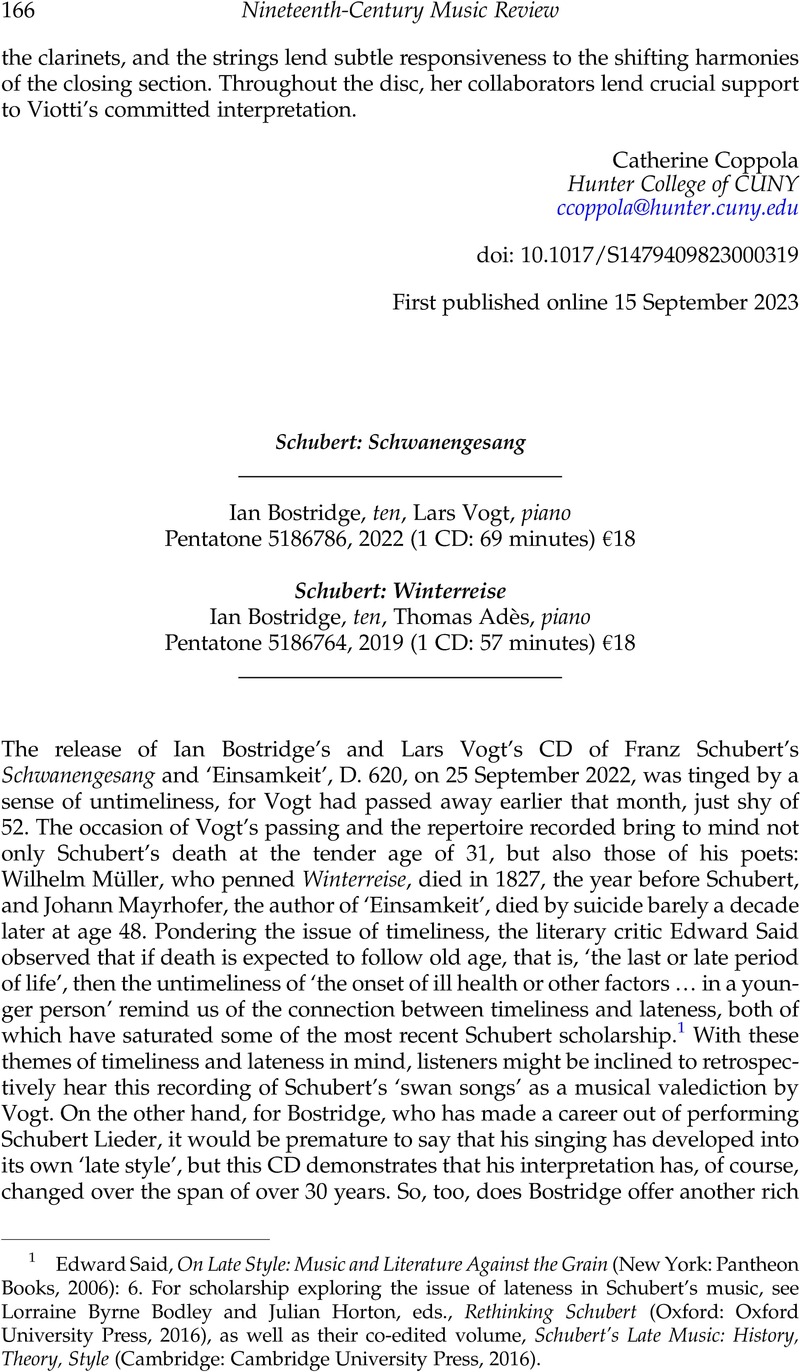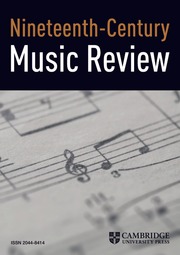No CrossRef data available.
Article contents
Schubert: Schwanengesang Ian Bostridge, ten, Lars Vogt, piano Pentatone 5186786, 2022 (1 CD: 69 minutes) €18 - Schubert: Winterreise Ian Bostridge, ten, Thomas Adès, piano Pentatone 5186764, 2019 (1 CD: 57 minutes) €18
Review products
Published online by Cambridge University Press: 15 September 2023
Abstract

- Type
- CD Review
- Information
- Nineteenth-Century Music Review , Volume 21 , Special Issue 1: Clara Schumann: Changing Identities and Legacies , April 2024 , pp. 166 - 173
- Copyright
- Copyright © The Author(s), 2023. Published by Cambridge University Press
References
1 Said, Edward, On Late Style: Music and Literature Against the Grain (New York: Pantheon Books, 2006): 6Google Scholar. For scholarship exploring the issue of lateness in Schubert's music, see Bodley, Lorraine Byrne and Horton, Julian, eds., Rethinking Schubert (Oxford: Oxford University Press, 2016)CrossRefGoogle Scholar, as well as their co-edited volume, Schubert's Late Music: History, Theory, Style (Cambridge: Cambridge University Press, 2016).
2 Bostridge's first recording of Winterreise, accompanied by Julius Drake on piano, was a staged film directed by David Alden, released on DVD format by NVC Arts in 1997. In his second recording of the song cycle in 2004, Bostridge collaborated with pianist Leif Ove Andsnes for the Warner Classics label.
3 Howe, Blake, ‘Whose Winterreise?’, Nineteenth-Century Music Review 13/1 (2016): 113–22Google Scholar.
4 Howe, ‘Whose Winterreise?’; Williamson, George, ‘On the Move: Outcasts, Wanderers and the Political Landscape of Die Winterreise’, in The Cambridge Companion to Schubert's Winterreise, ed. Hirsch, Marjorie and Feurzeig, Lisa (Cambridge: Cambridge University Press, 2021): 129–44Google Scholar.
5 Adorno, Theodor W., ‘Late Style in Beethoven’, in Essays on Music, ed. Leppert, Richard, trans. H., Susan Gillespie (Berkeley: University of California Press, 2002): 567Google Scholar.
6 Adorno, ‘Schubert’, in Can One Live After Auschwitz?: A Philosophical Reader, ed. Rolf Tiedemann, trans. Rodney Livingstone (Stanford: Stanford University Press, 1999): 299. Throughout Adorno's ‘Schubert’ essay, he develops imagery of the underworld with the motif of death. These themes owe their influence to Walter Benjamin's Origin of the German Trauerspiel, published in 1928, the same year as that Adorno penned the ‘Schubert’ essay.
7 Howe, ‘Whose Winterreise’, 117.
8 Daniel K. Chua, interview with Ian Bostridge, Episode 8, ‘Schubert's Song Cycles’, January 2022, in Music in Words, podcast, 30:00, https://open.spotify.com/episode/23FHtiPbYDcNseZpAmgVlM?si=5626ec264da04fb9 (accessed 2 August 2023).
9 Armitage-Smith, Julian, , ‘Schubert's “Winterreise”, Part I: The Sources of the Musical Text’, The Musical Quarterly 60/1 (1974): 26–31Google Scholar. In bar 47 of the autograph, the Ds in the left hand are not raised on the first beat, but one can safely assume that they were meant to be notated as D-sharp and that Schubert simply neglected to notate the accidentals. Armitage-Smith observes that on beat 1 of bar 47, the notation of F-double-sharp in the left hand clashes against the F-sharp in the right hand; he believes that Schubert simply overlooked the right hand accidental and that the right-hand F-sharp is supposed to be an F-double-sharp, as indicated in the last eighth note of that bar. The critical report does not mention changes to the harmony in bar 47 or to the rhythm in bars 62–5. See Dürr, Walter, Kritischer Bericht, Serie IV, Band 4, hrsg. Internationalen Schubert-Gesellschaft (Kassel: Bärenreiter, 1979): 208–10Google Scholar.
10 As Otto Eric Deutsch details in the Documentary Biography, the composer's brother, Ferdinand, offered the ‘the last thirteen songs’ to Haslinger on 17 December 1828. While Ferdinand specified the authors of the thirteen songs (seven by Rellstab, six by Heine), he did not call the Lieder ‘Schwanengesang’ – rather, this title is written in Haslinger's hand on the outside of Ferdinand's letter enclosing the songs. Furthermore, Haslinger later added Seidl's ‘Die Taubenpost’ as the fourteenth song of the cycle. Deutsch, Schubert: A Documentary Biography, trans. Eric Blom (London: J. M. Dent, 1946): 842–4.
11 For a reinterpretation of the order of Schubert's Heine songs in Schwanengesang, see Goldschmidt, Harry, ‘Welches war die ursprüngliche Reihenfolge in Schuberts Heine-Liedern’, Deutsches Jahrbuch der Musikwissenschaft für 1972 (1974): 52–62Google Scholar. For a critique of Goldschmidt, see Kramer, Richard, ‘Schubert's Heine’, 19th-Century Music 8/3 (1985): 213–25CrossRefGoogle Scholar.
12 Bostridge, liner notes to Winterreise CD, 8.
13 Widely recognized as the first song cycle, Beethoven's An die ferne Geliebte (1816) preceded the composition of ‘Einsamkeit’ by two years. Susan Youens asserts that the cycle, unique in its setting of six poems by Alois Jeitteles to continuous music, would not have passed Schubert unnoticed. Susan Youens, ‘A Gauntlet Thrown: Schubert's “Einsamkeit”, D. 620, and Beethoven's An die Ferne Geliebte’, in Rethinking Schubert, ed. Bodley and Horton, 456.
14 Beyträge zur Bildung der Jünglinge 2 (Vienna, 1818): 15.
15 David Gramit, ‘The Intellectual and Aesthetic Tenets of Franz Schubert's Circle: Their Development and Their Influence on His Music’ (PhD diss., Duke University, 1987): 45.
16 Youens, ‘A Gauntlet Thrown’, 459.
17 Otto Erich Deutsch, Schubert: A Documentary Biography, 226–8.
18 , Deutsch, Schubert: Memoirs by his Friends (London: A. & C. Black, 1958): 137–8Google Scholar.
19 Said, On Late Style, 24.





